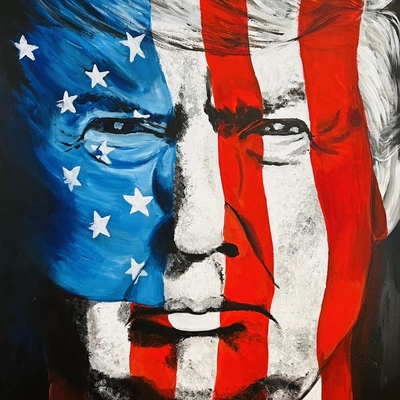Stay informed on the latest Truth Social posts from Donald Trump (@realDonaldTrump) without the doomscrolling. Consider it a public service for your mental health. (Why?)
- Europe has imposed a $3.5 Billion fine on Google.
- This fine, and others like it, divert money from American investments and jobs.
- Europe has issued many fines and taxes against Google and other American Tech Companies, notably a $17 Billion fine against Apple.
- These actions are very unfair and discriminatory.
- The American Taxpayer will not tolerate these actions.
- The author's administration will not allow these discriminatory actions to stand.
- The $17 Billion fine on Apple should be refunded.
- Such actions impede American ingenuity.
- If these penalties continue, the author will be compelled to initiate a Section 301 proceeding to nullify them.
The post directly names major S&P 500 companies (Google, Apple) and explicitly threatens the use of a Section 301 proceeding. Such a trade action against a significant economic partner like Europe could introduce substantial uncertainty for multinational corporations, potentially affecting their revenue, profit margins, and stock valuations, particularly within the technology sector, which heavily influences the S&P 500.
The post explicitly threatens a 'Section 301 proceeding' against Europe, a major economic bloc, in response to fines on American companies. This constitutes a direct economic ultimatum from the President of the United States of America, indicating a significant escalation of trade tensions that could have broader geopolitical implications.
- Commodities: Heightened trade tensions between the US and Europe could lead to a 'risk-off' sentiment, potentially increasing demand for safe-haven assets like Gold (XAU) and Silver. Industrial commodities such as Copper could see dampened demand due to concerns over global economic growth. Oil (WTI) prices might react to overall economic sentiment and potential disruptions to global trade. Short-Term Watchlist: XAU/USD price action, headlines on potential trade negotiations or retaliatory measures. Medium-Term Focus: Global growth forecasts, inflation trends, and the trajectory of the US Dollar.
- Currencies (Forex): The US Dollar Index (DXY) might initially strengthen as a safe-haven currency amid increased uncertainty, but sustained trade disputes could eventually weigh on the dollar if global growth significantly decelerates. The EURUSD pair is likely to experience increased volatility given the direct mention of Europe and the potential for retaliatory trade actions. Other major pairs like USDJPY and USDCNH could also react to broader risk sentiment. Short-Term Watchlist: Global risk sentiment, EU/US trade headlines, and any statements from central bank officials. Medium-Term Focus: Divergence in central bank policies, global growth differentials, and changes in global dollar liquidity.
- Global Equities: The S&P 500, Nasdaq, and European equity indices (e.g., STOXX 600) could face downward pressure due to the increased trade uncertainty and potential negative impacts on corporate earnings, particularly for multinational technology companies. A 'risk-off' sentiment could prevail across global markets. Short-Term Watchlist: Futures performance at market open, VIX spikes, performance of FANG/tech sectors, and European equity futures. Medium-Term Focus: Revisions to corporate earnings forecasts, key macroeconomic data releases, global capital flows, and the lingering geopolitical overhangs related to trade policy.
- Fixed Income (Bonds): Increased risk aversion and concerns about slower economic growth due to trade disputes could trigger a flight to safety, leading to falling yields on US 10Y and 2Y Treasuries. Credit spreads might widen if corporate profitability is perceived to be at risk, reflecting increased investor concerns about credit quality. Short-Term Watchlist: UST 10Y yield levels and credit ETF flows. Medium-Term Focus: Federal Reserve policy outlook, fiscal concerns, and economic surprise indices as they relate to trade policy implications for growth.
- Volatility / Derivatives: The VIX is highly likely to spike in response to the increased trade uncertainty and geopolitical tensions. Options positioning could reflect an increased demand for hedging against potential market downturns. Short-Term Watchlist: VIX levels and the VIX futures term structure. Medium-Term Focus: Shifts in the volatility regime, macro policy uncertainty, and the potential for systemic tail risks arising from trade conflicts.
- Crypto / Digital Assets: Bitcoin (BTC) might initially behave as a risk-on asset, correlating with technology stocks and potentially declining if broader market sentiment turns negative. However, in a prolonged trade conflict, it could also be viewed as a hedge against traditional financial system instability or fiat currency devaluation. Short-Term Watchlist: BTC/USD price action, correlation to tech stock performance, and funding rates in derivatives markets. Medium-Term Focus: Regulatory developments, macro liquidity backdrop, and the evolving perception of crypto as an alternative asset.
- Cross-Asset Correlations and Systemic Risk: The market could observe a breakdown in normal cross-asset correlations (e.g., equities and bonds selling off simultaneously) if trade disputes are perceived as a systemic risk to global financial stability. Signs of margin calls or liquidity stress might emerge if market volatility significantly increases. Short-Term Watchlist: The MOVE index, performance of junk bond ETFs, and the co-movement of gold and the US Dollar. Medium-Term Focus: Potential risks within the shadow banking system, prospects for central bank intervention, and signs of stress within market plumbing.
- Retail Sentiment / Market Psychology: The strong rhetoric and direct challenge to Europe could mobilize nationalist sentiment among retail investors, potentially influencing their investment decisions, such as favoring American companies or expressing disdain for European actions. Increased political polarization around trade issues could become a significant factor in retail trading behavior. Short-Term Watchlist: Trends on social media platforms like Twitter/X and Reddit related to trade and technology, and any mentions on platforms like TikTok. Medium-Term Focus: The influence of social media on market structure, the potential for coordinated retail pushes, and any policy or regulatory responses to retail trading behavior.

